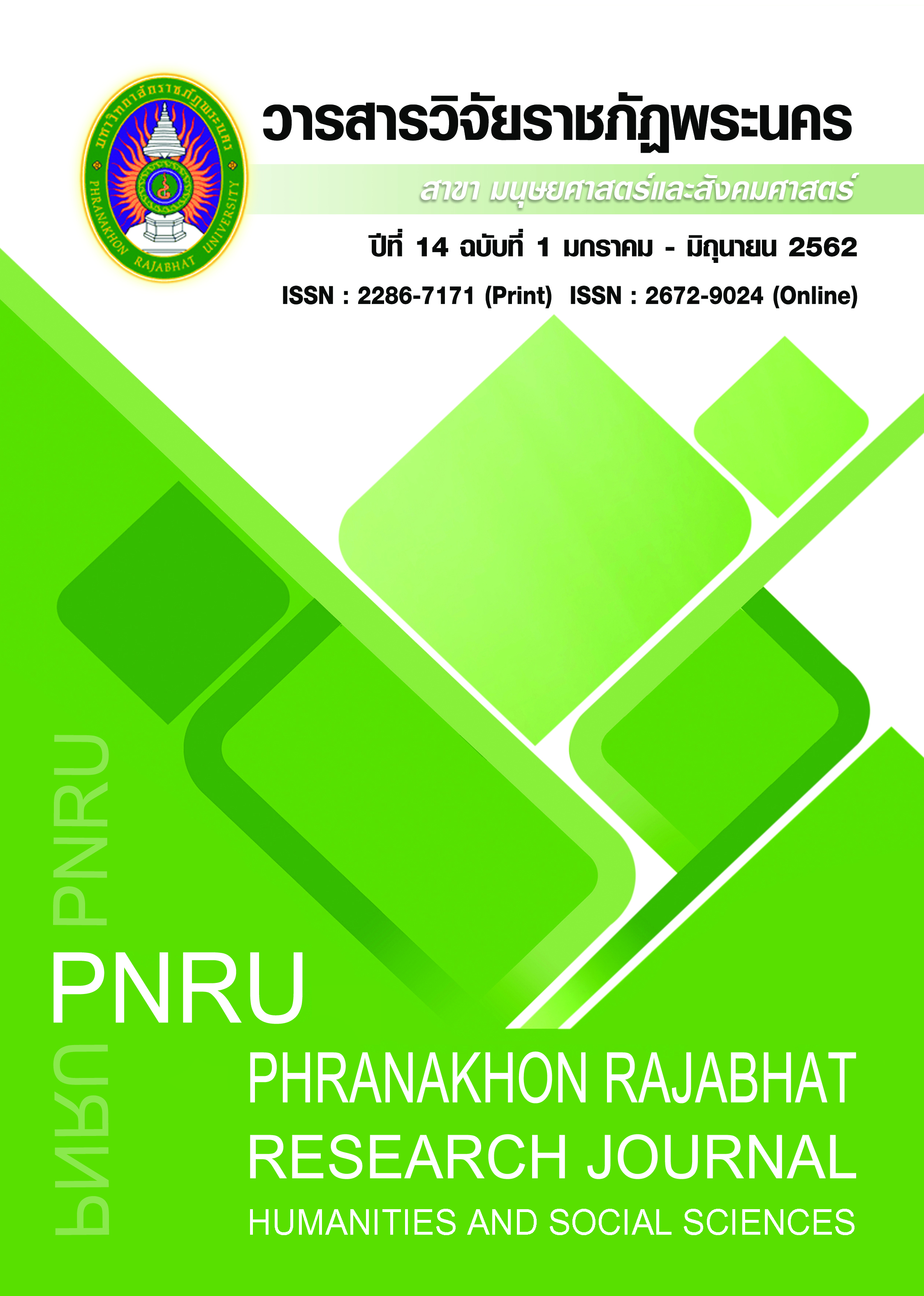THE TRAINING MODULE DEVELOPMENT BASED ON NEO-HUMANISM AND BUDDHISM CONCEPTS FOR DEVELOPING THE DESIRABLE CHARACTERISTICS OF TEACHER COLLEGE PHRANAKHON RAJABHAT UNIVERSITY
Main Article Content
Abstract
The purposes of this research were (1) to develop the neo-humanism and Buddhism concepts training module, and (2) to study the result of the implementation of Neo-humanism and Buddhism concepts training module towards the compassion, humbleness, gratitude to person and motherland as well as good mental health of the university students. The research instruments composed of training module and the assessment sheet for 5 desirable characteristics. Cronbach’s Alpha was used to examine the reliability of the test at 0.73 - 0.81. The samples of the study were 121 students of College of Teacher Education, Phranakhon Rajabhat University, which were randomly divided into 2 groups: 61 students of an experimental group and 60 students of a control group by the Stratified Random Sampling.The research design was pretest–posttest control group design. The statistical analysis was frequency, percentage, mean, standard deviation and t-test. The research findings were as follows: (1) The developed Neo-humanism and Buddhism concepts training module was composed of 22 activities namely: the 14 hour of 13 activities in neo-humanism concept, and 10 hour of 9 activities in Buddhist concept. The duration of training period completed in 4 days. (2) After the termination of the Neo-humanism and Buddhism concepts training module implementation, it was found that the trained students had the higher scores level on being compassion, humbleness, grateful to person and motherland, and good mental health, than the untrained students at the statistical significance of 0.05.
Article Details
Each publish articles were copyright by Phranakorn Rajabhat University
Any contents which appeared in each articles in the journal were authors personal opinion. It did not relate to Phranakorn Rajabhat University and other instructors in the university. Each authors would take responsibility on their articles. If there are any mistake, the authors will take responsibility themselves
References
Inhue, S. (1998). The result of meditation practice based on the neo-humanism toward the aggressive behavior of lower - secondary school students. Master of Education Program Educational Psychology and Guidance. Faculty of Education, Chiengmai University. (in Thai)
Jain, S.L. et al. (2007 ). A randomized controlled trial of mindfulness meditation versus relaxation training: effects on distress, positive states of mind, rumination, and distraction. Annals of Behavioral Medicine, 33(1), 11-21.
Mascaro, J.S. (2011). A longitudinal investigation empathic behavior and neural activity and their modulation by compassion meditation. Ph.D Program in Anthropology. Faculty of the James T. Laney School of Graduate Studies, Emory University.
National Health Act. (2007). National Healt Act. Retried March 7, 2007, from https://www.thaihealth.or.th/ (in Thai)
PhrakhruSrisutasopon (Ngeng Chatamethi). (2006). The Gratitude in the Condition of Morality Uphold Society in the Buddhism Perspective. M.D. Program in Buddhism, Faculty of Philosophy, Chulalongkornrachawithayalai University. (in Thai)
Phrapromkunaporn (P.O.Payutto). (2010). Dictionary of Buddhism Technical Terms Collection Copy. 15th edition. Bangkok: Sahathummic Publishing. (in Thai)
Phrapromkunaporn. (P.O. Payutto). (2011). Dictionary of Buddhism pra-muan-dhaama.pd. Retrived March 7, 2011, from https:// 84000.org/ tipitaka/dic/d_item.php?i=278. (in Thai)
Praraththajariya, K., & Leowarin, U. (2015). Research and development of the Buddhist mind training module enhancing the Psychological and Buddhist characteristics of the university students. Bangkok: Suan Sunandha Rajabhat University. (in Thai)
Royal Institute. (2013). Royal Institute Dictionary (version 2011), the Celebrations on the Auspicious Occasion of His Majesty the King’s 84th Birthday Anniversary. Bangkok: Siriwattana Inter-Print Limited. (in Thai)
Sarkar, Prabhat Ranjan. (1982). The liberation of intellect: neohumanism. Kolkata: Ananda Marga Publications.
Secretariat Office of the Teachers Council of Thailand, Ministry of Education. (2006). Career guide in education. Bangkok: Kurusapa Publisher Ladproa. (in Thai)
Siripunyawong, C. (2007). Development of non-formal education learning model to enhance mental health by using the principles of Neo-Humanists and Learning Contracts. Ed.D. Program in Non-Formal Education, Faculty of Education, Chulalongkorn University. (in Thai)
Thai Health Promotion Foundation. (2010). Well being. Retrieved March 7, 2010, from https://www.thaihealth.or.th/. (in Thai)
The Free Dictionary. (2008). The free dictionary: dictionary, encyclopedia and thesaurus. Retrieved December 5, 2008, From https://www.the freedictionary. com / humbleness.


